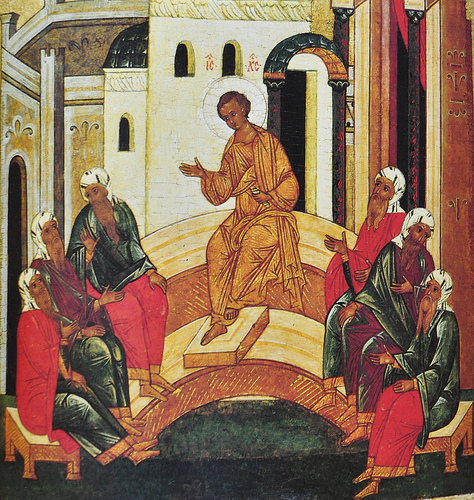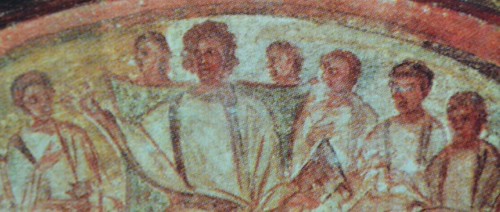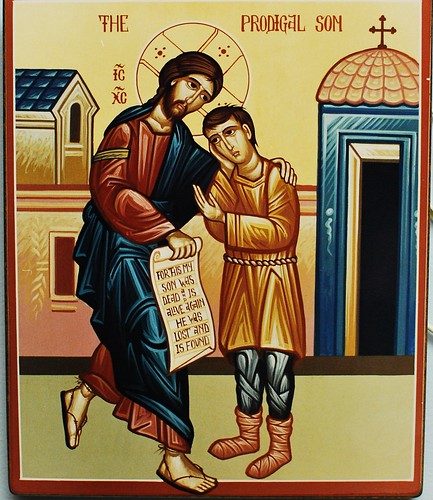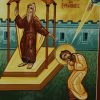He taught us to love one another.
He taught us to to serve one another.
He taught us to forgive one another.
He taught us to humble ourselves.
He taught us to do as He did and wash each other’s feet.
He taught us to see our own sins and not to judge others.
He taught us to sin no more.
He taught us to see God, Father, Son and Holy Spirit.
He taught us the way to the kingdom of Heaven.
He taught us to deny ourselves and to take up our cross and follow Him.
He taught us to be perfect as our heavenly Father is perfect – in other words – He told us to be like God.
He never said, “Be good” but He did want us to see God, to become God’s people, to participate in the Divine Life which He shares with us. As St. Athanasius would sum up the Gospel commandments: “God became man in Christ so that we humans might become divine.”
Christ did not come to be the Chief of the Moral Police. He came to unite us to heaven. He came so that we could participate in the Divine Life shared by the Three Persons of the Holy Trinity – Father, Son and Holy Spirit. He came to show us how to love like God so that we would imitate God in our love for one another. When we reduce Christ to some kind of moral detective or prosecuting attorney, we dishonor Him. Jesus Christ is God. God is love. Jesus is love incarnate. He offers to share the divine life with us, to restore all that humanity and creation has lost due to human sinfulness.
In the Desert Fathers we encounter stories showing how these early Christians imagined imitating Christ by following the Gospel commandments. Sometimes the stories are quite counter intuitive and they do challenge our modern sensibilities. Here are two such stories for us to ponder as we discern how to follow Christ in our lives. Keep in mind these are lessons from people who were both maximalistic and idealistic in their beliefs about what it means to take the Gospel seriously. They saw the Gospel commandments as what guides life in heaven – yet they were attempting to live them in this world of the Fall.
1}
A monk asked a Spiritual Elder: “If I see my brother living in sin, should I despise him?”
The Elder replied: If we cover over the fault of our brother, God will cover over our sins too. But if we reveal our brother’s sins to others, God will expose our sins to others also.”
2}
There was a very spiritual monk named Timothy and all the monks in the monastery admired him. One time one of the monks fell into temptation. The Abbot came to Timothy to ask his advice on what to do. “What shall I do with our fallen brother?”
Timothy replied: “Expel him from the monastery.” So the Abbot expelled him from the community.
That same day the same temptation fell on the holy Timothy, and he spent the entire night crying and weeping, saying: “I have sinned, O Lord, have mercy on me.” And “I have sinned, O Lord, forgive me.”
At dawn, God spoke to Timothy and said: “Timothy, this happened to you because you sinned against your neighbor in the time of his trial.”
Our task as Christians is not to be the moral police of those around us. Our duty is to rid ourselves of all blindness so that we can first see our own sins and repent. Then we will see clearly God’s Kingdom and walk the way of the Cross to get there, inviting neighbor, family, friend and enemy to join us on the way.
[Having had to deal with sexual abuse in the Church, I will add that the above thought applies to many of our interactions with people. However there are cases which require extra wisdom, courage and love to discern. We are not to be foolishly blind to evil, nor are we to ignore or enable sexual predators or abusive leaders – we have a duty to love and protect those who are vulnerable from those who would sin against them or lead them into sin. And we have to figure out how to love the sinner as well. Being a disciple of Christ doesn’t give us a pass from having to deal with evil or complex problems.]



















